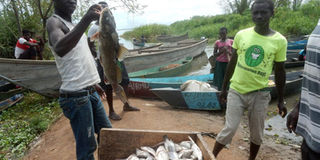Prime
Lake Kyoga fishermen fail to find fish, money

A fisherman displays the day’s catch at a landing site on the shores of Lake Kyoga last week. PHOTO BY BILL OKETCH
What you need to know:
- Peterson Ocen, 38, who grew up at the landing site, says the decline in the fish stocks is strange.
- Small fish (size four) that used to be sold at Shs2, 500, is now sold at Shs3, 500 in most local restaurants at Kayei.
- Rapid population growth on the floating islands (suds) coupled with bad fishing methods are depleting fish stocks, according to Mr James Opira, a fisheries officer in Akokoro Sub-county.
APAC. Fishermen on Lake Kyoga in Apac District are facing an uncertain future due to decreasing fish stocks.
Francis Onapa,59, a fisherman operating at Kayei Landing Site, Akokoro Sub-county in Apac District, says he can hardly cater for his 11 children.
Onapa says a few years ago, he could catch fish worth Shs180, 000 on a daily basis, but now, he considers himself lucky if he catches fish worth Shs10, 000.
On several occasions Onapa says he returns from the lake empty handed. “These days, it’s very hard for me to feed my family and educate my children,” Onapa says.
“Today, the water level has risen but there is no fish in the lake. Many people cannot now earn a living because we are not realising any catch,” he adds.
Charity Atimango, a resident, says: “Our husbands are not fulfilling their responsibility of providing for the family because they are crying that they don’t have money. For instance, men now leave behind Shs3,000 for the whole day and out of this money, they expect you to buy food, firewood and other small items.”
She adds that some youth at Kayei Landing Site have now resorted to stealing.
Items worth millions of shillings were recently stolen by unknown thugs who broke into a shop belonging to Bosco Ojok.
Peterson Ocen, 38, who grew up at the landing site, says the decline in the fish stocks is strange.
“Since I was born, we have never experienced this kind of problem,” Ocen says.
Andrew Okello, who owns a restaurant at Kayei Landing Site, says the price of fish has increased due to the scarcity.
He adds: “We are not making any profit at all because high prices of fish are chasing our customers away.”
Small fish (size four) that used to be sold at Shs2, 500, is now sold at Shs3, 500 in most local restaurants at Kayei.
Rapid population growth on the floating islands (suds) coupled with bad fishing methods are depleting fish stocks, according to Mr James Opira, a fisheries officer in Akokoro Sub-county.
“Suds are the breeding grounds for fish where fish are supposed to stay there undisturbed, so that they can produce. But these days you find that the majority of the people are living in the suds. Like in Apac here, we have over 11 suds,” he says.
Opira says those living in the suds should be evicted to enable fish stocks in the lake to increase.
He adds that some individuals are claiming ownership to certain portions of the lake as the fish stock in the lake continues to dwindle.
“People are cutting tree branches from outside. The tree branches and sand are taken in the lake to create a plot, causing siltation of the lake. So you cannot expect good production of fish in the lake,” the fisheries officer explains.
According to Mr Opira, another problem facing the management of the lake is use of illegal fishing.
“We have been holding meetings with the community, sensitising them on the dangers of using those illegal fishing gears. Because now you find them complaining that they don’t have fish in the lake yet it’s them who have caused all that kind of thing,” Mr Opira says.
Ms Ruth Nankabirwa, former Fisheries state minister, recently said the Uganda People’s Defence Forces (UPDF) would continue monitoring Lake Kyoga to make sure that people staying illegally on the floating islands are evicted.
She said previous efforts to evict those staying on the suds had failed due to inadequate manpower.
“They (people staying on the suds) were so intimidating. Nobody could really afford going there to evict such people without the assistance of UPDF and police,” Ms Nankabirwa said.
Operation against those dealing in illegal fishing on Lake Kyoga started in 2014. It is jointly carried out by the UPDF, police and fisheries enforcement team together with the local leaders of the four districts surrounded by the Lake Kyoga: Nakasongola, Amolatar, Dokolo and Apac.
However, the operation led by the police has been widely criticised by human rights bodies and the opposition.
The former Fisheries state minister further warned that those who do not leave the suds voluntarily would be arrested and prosecuted.
“Their days are numbered. We shall hunt for them, we want them alive,” she said, adding that those living in the suds had a “rope around their necks and they don’t know”.
When Ms Nankabirwa was still in charge of fisheries, at least 500 people were evicted from suds and relocated to gazetted landing sites of Kayei, Acholi Inn, Palamio, Wansolo, Kiga and Kampala Kagoye.
During the operation, a total of 527 huts which fishermen were using as their homes and illegal fishing gear were destroyed.




